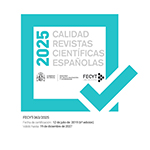Communication as an essential aspect in the transmission of stereotypes: an approach to the model of femininity according to Fallaci
Abstract
Introduction. Delving into the origins of gender stereotypes has been one of the objectives of feminism since its inception. Thus, for Beauvoir, sexual inequality originates from the 'myth' of femininity that has perpetuated a historically hegemonic androcentric society, hence its objective is egalitarianism. Feminism evolved towards others, such as the feminism of difference, which, on the contrary, aims to preserve sexual differences. Objectives and methodology. Our work will show a new facet that Oriana Fallaci calls Advanced Feminism from the analysis of the chronicle related in The Second Sex in which, without polemicising with that of equality, she approaches the feminism of difference and radical feminism, and considers that stereotypes are generated in the heart of patriarchy (there is no society free of them) and all derive from the triple family, social and communicative origin that intervenes in the processes of socialisation, also in matriarchal societies. Results. Functionally, the original combination of the emic and ethical perspectives of cultural anthropology allows Fallaci to conclude the existence of a symbolic universe that refutes both the stereotype of female uselessness in exotic societies and the autonomy and progress in other societies. Conclusions. Methodologically, the analogical method applied to fashion as a symbol of patriarchal domination shows that Fallaci moves away from Beauvoir when she concludes that beyond the rigidity and objectification denounced by the feminism of equality, behind fashion there are hidden economic, exotic or cultural motivations that make it useful and, with it, women. In addition, Fallaci shows that the triple origin of the stereotype provides both women and men with axiological, aesthetic and cognitive models specific to each culture in which not only femininity but also masculinity is transmitted, and in which tourist advertising in particular, and the media in general, collaborate in the dissemination of their identity models.
Downloads
Article download
License
In order to support the global exchange of knowledge, the journal Investigaciones Feministas is allowing unrestricted access to its content as from its publication in this electronic edition, and as such it is an open-access journal. The originals published in this journal are the property of the Complutense University of Madrid and any reproduction thereof in full or in part must cite the source. All content is distributed under a Creative Commons Attribution 4.0 use and distribution licence (CC BY 4.0). This circumstance must be expressly stated in these terms where necessary. You can view the summary and the complete legal text of the licence.











